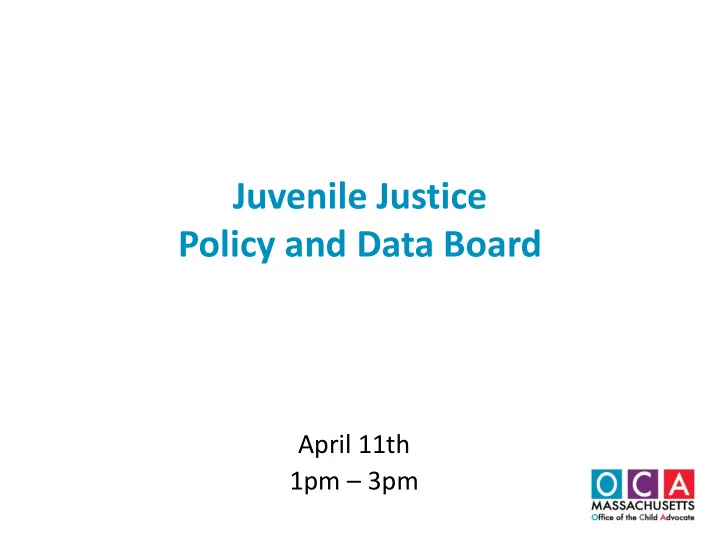

Juvenile Justice Policy and Data Board April 11th 1pm – 3pm
Agenda • Welcome and Introductions • Approval of February 27 th Meeting Minutes • Report outs: – Data Subcommittee – Community-Based Interventions Subcommittee – Childhood Trauma Task Force • Discussion on Arrest/Jurisdiction Authority Implementation Challenges
SUBCOMMITTEE REPORT OUTS
Data Subcommittee • Statutory Impact Framework o Discussed & edited framework document o Developing plan to pull baseline & Year 1 data June 30 th Aggregate Data Report • o Subcommittee will review draft report May 9 th o If substantial revisions are needed, may review again at June 7th meeting o Full Board will discuss & vote on report at June 12 th meeting
Community-Based Interventions Subcommittee • March/April Meetings: Focused on Police Diversion & DA Diversion • May Meeting: Focus on Judicial Diversion & Probation Diversion Assessment Process • Surveys Out in the Field for: – Service Referrers – Community-Based Providers
Community-Based Interventions Subcommittee Emerging Themes: • Wide variation in practice from town to town and county to county o Criteria for who is diverted o Which entities are using diversion o Level of adoption of research-based practices (e.g. use of risk & need assessments to match youth to services, data collection) • Resource challenges o Transportation o Mental health services & waitlists o Services for higher risk/need youth
Childhood Trauma Task Force • March: Violence & Childhood Trauma – ROCA – Child Witness to Violence • April: School-Based Interventions – Trauma & Learning Policy Initiative – BPS/Children’s Hospital School -Based Initiatives – DESE Safe & Supportive Schools • May: Immigration/Refugee-Related Trauma
DISCUSSION ON IMPLEMENTATION CHALLENGES
Litigation Update • Pending litigation re: definition of “delinquent child” as it relates to “first offense of a misdemeanor for which the punishment is a fine, imprisonment in a jail or house of correction for not more than 6 months” • Arguments heard at SJC on April 4 th
Goals of Law Change • Shift system response for some behaviors from justice system to private domain or other state services (when warranted) – Younger children (under 12) – Lower-level misdemeanors • Reduce referrals to justice system for nonviolent and verbal misconduct in schools and instead handle this behavior through school disciplinary measures Source: “Juvenile Justice Reform in the Criminal Justice Package”, Senator Brownsberger’s website (www.willbrownsberger.com/juvenile-justice-reform/)
Today’s Focus • What are the kinds of youth behaviors we are seeing that previously may have been responded to with an arrest/charge and now, under the new law, requires a different response? • What would be the ideal system response to those different kinds of behaviors? • What needs to change for us to have a system where that “ideal” response happens in all communities?
Common Offenses Impacted by Statute Change Youth Under 12 • All offenses Lower- Level “Under 6 Mos ” Offenses • Trespass • Disorderly Conduct • Disturbing the Peace • Wanton or Malicious Destruction of Property under $250 • Annoying or Obscene Telephone Calls or Electronic Communication • Accosting/Annoying Person of the Opposite Sex • Indecent Exposure • Threat to Commit Crime • Possess, Distribute or Possess with Intent – Drug Class E [Class E = Narcotics that contain limited amounts of such substances as codeine, diphenoxylate or opium] • Possess less than 1 oz, Marijuana • Assorted Moving Vehicle Violations School-Based Offenses • Disturbing a school assembly • Disorderly conduct
What Does the Research Say? • Limit testing is age appropriate and temporary for most adolescents • Youth that are diverted are less likely to reoffend than youth that are arrested and formally processed • Using validated, structured decision-making tools is key to successfully identifying youth that are appropriate for diversion • Research is mixed on the effectiveness of different types of diversion programs, but a focus on quality and QA is important • Relevant Examples: – Florida Juvenile Assessment Centers – Civil Citation Programs in FL and DE Source: CSG Research Memo, sent to JJPAD Board 4.4.19
Summary of Concerns and Potential Unintended Consequences • Youth failing through the cracks: Are there more youth who need services that we are failing to reach because of the law changes? • Public safety: Is the public more at risk because of the law changes? • Schools: Have school environments been negatively impacted by the law changes? – School safety – School learning environment • Accountability: Are we harming youth by sending a message that certain behaviors “aren’t serious” and/or by failing to hold them accountable through the justice system? • Is anything missing from this list?
What is the Right System Response? What What is What is the Why are we response needed for behavior? concerned? would address that response concern? to occur?
Next Meeting • Full Board Meeting: June 12 th , 12pm – 2pm • Subcommittees: – Data Subcommittee: May 9th, 2-4pm – CBI Subcommittee: May 21 st , 2-4pm – Childhood Trauma: May 14th, 9-11am – Diversity & Inclusion: Working on scheduling
Recommend
More recommend